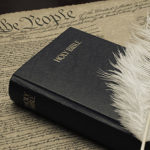Standing on the steps of the U.S. Capitol almost a century ago, May 16, 1920, Baptist statesman and Dallas pastor George W. Truett delivered one of the greatest speeches on Christian political responsibility, “Baptists and Religious Liberty.”
Truett’s words have echoed through the generations, inspiring fidelity, passion and sacrifice.
Here are excerpts:
“Indeed, the supreme contribution of the new world to the old is the contribution of religious liberty. This is the chiefest contribution that America has thus far made to civilization. And historic justice compels me to say that it was pre-eminently a Baptist contribution. The impartial historian, whether in the past, present or future, will ever agree with our American historian, Mr. (George) Bancroft, when he says: ‘Freedom of conscience, unlimited freedom of mind, was from the first the trophy of the Baptists.’ And such historian will concur with the noble John Locke who said, ‘The Baptists were the first propounders of absolute liberty, just and true liberty, equal and impartial liberty.’ Ringing testimonies like these might be multiplied indefinitely. …
 George W. Truett“Baptists have one consistent record concerning liberty throughout all their long and eventful history. They have never been a party to oppression of conscience. They have forever been the unwavering champions of liberty, both religious and civil. Their contention now, is, and has been, and, please God, must ever be, that it is the natural and fundamental and indefeasible right of every human being to worship God or not, according to the dictates of his conscience, and, as long as he does not infringe upon the rights of others, he is to be held accountable alone to God for all religious beliefs and practices.
George W. Truett“Baptists have one consistent record concerning liberty throughout all their long and eventful history. They have never been a party to oppression of conscience. They have forever been the unwavering champions of liberty, both religious and civil. Their contention now, is, and has been, and, please God, must ever be, that it is the natural and fundamental and indefeasible right of every human being to worship God or not, according to the dictates of his conscience, and, as long as he does not infringe upon the rights of others, he is to be held accountable alone to God for all religious beliefs and practices.
“Our contention is not for mere toleration, but for absolute liberty. There is a wide difference between toleration and liberty. Toleration implies that somebody falsely claims the right to tolerate. Toleration is a concession, while liberty is a right. Toleration is a matter of expediency, while liberty is a matter of principle. Toleration is a gift from man, while liberty is a gift from God. It is the consistent and insistent contention of our Baptist people, always and everywhere, that religion must be forever voluntary and uncoerced, and that it is not the perogative of any power, whether civil or ecclesiastical, to compel men to conform to any religious creed or form of worship, or to pay taxes for the support of a religious organization to which they do not believe. God wants free worshippers and no other kind. …
 Edwin Hearne’s painting of George W. Truett delivering his 1920 address “Baptists and Religious Liberty” is part of the Eight Great Moments in Baptist History series. (SBHLA Image)“How is it, then, that Baptists, more than any other people in the world, have forever been the protagonists of religious liberty, and its compatriot, civil liberty? They did not stumble upon this principle. Their uniform, unyeilding and sacrificial advocacy of such principle was not and is not an accident. It is, in a word, because of our essential and fundamental principles. Ideas rule the world. A denomination is molded by its ruling principles, just as a nation is thus molded and just as individual life is thus moulded. Our fundamental essential principles have made our Baptist people, of all ages and countries, to be the unyeilding protagonists of religious liberty, not only for themselves, but for everybody else as well. …
Edwin Hearne’s painting of George W. Truett delivering his 1920 address “Baptists and Religious Liberty” is part of the Eight Great Moments in Baptist History series. (SBHLA Image)“How is it, then, that Baptists, more than any other people in the world, have forever been the protagonists of religious liberty, and its compatriot, civil liberty? They did not stumble upon this principle. Their uniform, unyeilding and sacrificial advocacy of such principle was not and is not an accident. It is, in a word, because of our essential and fundamental principles. Ideas rule the world. A denomination is molded by its ruling principles, just as a nation is thus molded and just as individual life is thus moulded. Our fundamental essential principles have made our Baptist people, of all ages and countries, to be the unyeilding protagonists of religious liberty, not only for themselves, but for everybody else as well. …
“Although the Baptist is the very antithesis of his Catholic neighbor in religious conceptions and contentions, yet the Baptist will whole-heartedly contend that his Catholic neighbor shall have his candles and incense and sanctus bell and rosary, and whatever else he wishes in the expression of his worship. A Baptist would rise at midnight to plead for absolute religious liberty for his Catholic neighbor, and for his Jewish neighbor, and for everybody else. …
“Baptists regard as an enormity any attempt to force the conscience, or to constrain men, by outward penalties, to this or that form of religious belief. Persecution may make men hypocrites, but it will not make them Christians.
Sign up for our weekly edition and get all our headlines in your inbox on Thursdays
“There must be no union between church and state, because their nature and functions are utterly different. Jesus stated the principle in the two sayings, ‘My kingdom is not of this world,’ and ‘Render therefore unto Caesar the things which are Caesar’s and unto God the things that are God’s.’ Never, anywhere, in any clime, has a true Baptist been willing, for one minute, for the union of church and state, never for a moment. …
“Every state church on the earth is a spiritual tyranny. And just as long as there is left upon this earth any state church, in any land, the task of Baptists will that long remain unfinished. Their cry has been and is and must ever be this:
Let Caesar’s dues be paid
To Caesar and his throne;
But consciences and souls were made
To be the Lord’s alone. …
“Baptists dared to defy traditions and customs, and deliberately chose the day of nonconformity, even though in many a case it meant a cross. They pleaded and suffered, they offered their protests and remonstrances and memorials, and, thank God, mighty statesmen were won to their contention. Washington and Jefferson and Madison and Patrick Henry, and many others, until at last it was written into our country’s Constitution that church and state must in this land be forever separate and free, that neither must ever trespass upon the distinctive functions of the other. It was pre-eminently a Baptist achievement. …
“Let us today and forever be highly resolved that the principle of religious liberty shall, please God, be preserved inviolate through all our days and the days of those who come after us. Liberty has both its perils and its obligations. We are to see to it that our attitude toward liberty, both religious and civil, both as Christians and as citizens, is an attitude consistent and constructive and worthy. We are to “Render therefore unto Caesar the things which are Caesar’s and unto God the things that are God’s.” We are members of the two realms, the civil and the religious, and are faithfully to render unto each all that each should receive at our hands; we are to be alertly watchful day and night, that liberty, both religious and civil, shall be nowhere prostituted and mistreated. Every perversion and misuse of liberty tends by that much to jeopardize both church and state.”
Additional articles from this series:
Following Jesus in a contentious election season
Editorial: How to survive a rugged political season
Former editors speak on Christian citizenship and religious liberty
Mobilizing advocates for Texas schoolchildren
This article first appeared in CommonCall: The Baptist Standard Magazine. An annual subscription is only $24. Subscribe today.














We seek to connect God’s story and God’s people around the world. To learn more about God’s story, click here.
Send comments and feedback to Eric Black, our editor. For comments to be published, please specify “letter to the editor.” Maximum length for publication is 300 words.